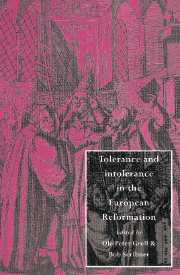Book contents
- Frontmatter
- Contents
- List of contributors
- Preface
- Dedication
- 1 Introduction
- 2 The travail of tolerance: containing chaos in early modern Europe
- 3 Preconditions of tolerance and intolerance in sixteenth-century Germany
- 4 Heresy executions in Reformation Europe, 1520–1565
- 5 Un roi, une loi, deux fois: parameters for the history of Catholic-Reformed co-existence in France, 1555–1685
- 6 Confession, conscience and honour: the limits of magisterial tolerance in sixteenth-century Strassburg
- 7 One Reformation or many? Protestant identities in the later Reformation in Germany
- 8 Toleration in the early Swiss Reformation: the art and politics of Niklaus Manuel of Berne
- 9 Tolerance and intolerance in sixteenth-century Basle
- 10 Exile and tolerance
- 11 The politics of toleration in the Free Netherlands, 1572–1620
- 12 Archbishop Cranmer: concord and tolerance in a changing Church
- 13 Toleration for Catholics in the Puritan revolution
- 14 The question of tolerance in Bohemia and Moravia in the age of the Reformation
- 15 Tolerance and intolerance in sixteenth-century Hungary
- 16 Protestant confessionalisation in the towns of Royal Prussia and the practice of religious toleration in Poland-Lithuania
- Index
8 - Toleration in the early Swiss Reformation: the art and politics of Niklaus Manuel of Berne
Published online by Cambridge University Press: 07 December 2009
- Frontmatter
- Contents
- List of contributors
- Preface
- Dedication
- 1 Introduction
- 2 The travail of tolerance: containing chaos in early modern Europe
- 3 Preconditions of tolerance and intolerance in sixteenth-century Germany
- 4 Heresy executions in Reformation Europe, 1520–1565
- 5 Un roi, une loi, deux fois: parameters for the history of Catholic-Reformed co-existence in France, 1555–1685
- 6 Confession, conscience and honour: the limits of magisterial tolerance in sixteenth-century Strassburg
- 7 One Reformation or many? Protestant identities in the later Reformation in Germany
- 8 Toleration in the early Swiss Reformation: the art and politics of Niklaus Manuel of Berne
- 9 Tolerance and intolerance in sixteenth-century Basle
- 10 Exile and tolerance
- 11 The politics of toleration in the Free Netherlands, 1572–1620
- 12 Archbishop Cranmer: concord and tolerance in a changing Church
- 13 Toleration for Catholics in the Puritan revolution
- 14 The question of tolerance in Bohemia and Moravia in the age of the Reformation
- 15 Tolerance and intolerance in sixteenth-century Hungary
- 16 Protestant confessionalisation in the towns of Royal Prussia and the practice of religious toleration in Poland-Lithuania
- Index
Summary
Preaching on the fraternal hatred of Joab and Abner, Calvin gave sombre council to his Genevan audience:
Thus we see that in Christendom people are tearing one another apart; let us realise that this is being taken into account by God, and even if men harden themselves, God does not change his mind. We have already seen battles for such a long time. There is no end to them. And even apart from battles, we have seen how many people have been killed by wars. This has not been the case merely in one place and in a single army, but has gone on among princes who claim to be Christians and Catholics – and yet they are killing an infinite number of people. And then the war has swept through one country like a storm. One sees poor people dead among the bushes, and others who are left have to endure hunger and thirst, and heat and cold, and many deprivations – to such a degree that if you cut their throat, you would do them a favour. For they are suffering and will die ten times, so to speak, before death strikes the final blow.
II Samuel is a book about war, deceit and murder: it is the book of Saul and Abner, Samuel and Jonathan, David and Bathsheba; and Calvin preached on the book between 1562 and 1563 as the Wars of Religion had begun to engulf his native France. Again and again, Calvin's principal message rings through: war of any sort is wrong, leading to the destruction of God's image in humanity, and claiming as its victims the poor, children, widows and the destitute.
Without doubt, it was France which was foremost in the mind of the ailing reformer.
- Type
- Chapter
- Information
- Tolerance and Intolerance in the European Reformation , pp. 128 - 144Publisher: Cambridge University PressPrint publication year: 1996
- 5
- Cited by



